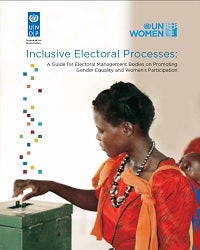Elections
National and local elections can support women’s political participation in multiple ways, but specific measures may be required to overcome the barriers of gender discrimination. Women candidates may face gaps in capacities or resources that prevent them from competing effectively, for instance. If polling stations are located in remote or unsafe areas, women voters may be reluctant to use them. Sometimes electoral management bodies are unaware of hindrances to women’s participation because they do not have the knowledge, skills or data to analyse and correct these.
Our solutions
UN Women works on measures supporting women’s political participation across the electoral cycle, including through coordinated efforts with UN system partners. One major focus is the adoption and implementation of temporary special measures or quotas, a proven mechanism for increasing the number of women in politics.
We also advocate for and provide evidence to inform national electoral regulations. These should ensure that women have fair opportunities to campaign and register to vote, and are protected from election-related violence.
Other activities comprise training women as effective political candidates and leaders. Engagement with political parties encourages greater gender sensitivity, such as through internal regulations and practices to promote women’s leadership.
At a critical point in Egypt’s political transition, UN Women helped establish the first Egyptian Feminist Union, comprising 500 women’s groups who advocate with a unified voice, and the Egyptian Coalition for Civic Education and Women’s Participation, which serves as an election watchdog. More than 500,000 people from 27 governorates have signed a National Charter highlighting women’s aspirations for the future of their country. In partnership with UN Women, the Government is implementing the “Women’s Citizenship” initiative to issue ID cards to 2 million women who need them to vote and access public services.
After Kenya’s 2010 Constitution guaranteed gender equality and the use of affirmative action, UN Women backed a gender audit of a draft Political Parties Bill to see if principles were translating into practice. The Interim Independent Electoral Commission subsequently adopted recommendations to make the bill more gender-responsive. When it passed into law, it stipulated that the registration of political parties depends on having no more than two-thirds of any gender in their governing bodies. Another provision requires filling vacant seats in the legislature with people of the same gender.
Partnering with women civil society and government leaders in Colombia, UN Women helped successfully advocate for the adoption of a 30-per-cent quota for women candidates in national elections. To engage the broader public, an ad campaign drove home the message that “Democracy without women is incomplete.”
Latest news
Featured Publication
-
Inclusive Electoral Processes: A Guide for Electoral Management Bodies on Promoting Gender Equality and Women’s Participation
The guide highlights the important work being carried out by electoral administrations in encouraging the participation of women across various points in the electoral cycle and offers examples of steps that can be taken to remove remaining barriers that continue to affect women’s participation in electoral processes. More
